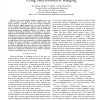Free Online Productivity Tools
i2Speak
i2Symbol
i2OCR
iTex2Img
iWeb2Print
iWeb2Shot
i2Type
iPdf2Split
iPdf2Merge
i2Bopomofo
i2Arabic
i2Style
i2Image
i2PDF
iLatex2Rtf
Sci2ools
ICC
2007
IEEE
2007
IEEE
Complexity and Error Propagation of Localization Using Interferometric Ranging
— An interferometric ranging technique has been recently proposed as a possible way to localize ad hoc and sensor networks. Compared to the more common techniques such as received signal strength, time of arrival, and angle of arrival ranging, interferometric ranging has the advantage that the measurement could be highly precise. However, localization using interferometric ranging is difficult as it requires a large number of measurement readings. In this paper, we provide a formal proof of this difficulty in terms of algorithmic complexity. Furthermore, we propose an iterative algorithm that calculates node locations from a set of seeding anchors, gradually building a more global localization solution. Compared to previous localization algorithms, which treat localization as a global optimization problem, the iterative algorithm is a distributed algorithm that is simple to implement in larger networks. More importantly, the iterative algorithm allows us to study the error propagat...
Communications | ICC 2007 | Interferometric Ranging | Interferometric Ranging Technique | Iterative Algorithm |
Related Content
| Added | 02 Jun 2010 |
| Updated | 02 Jun 2010 |
| Type | Conference |
| Year | 2007 |
| Where | ICC |
| Authors | Rui Huang, Gergely V. Záruba, Manfred Huber |
Comments (0)

